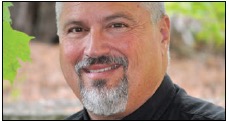Listening with the Heart of Christ
When the deacon brings a healing word
Deacon Steve Kramer Comments Off on Listening with the Heart of Christ
 As my wife and I searched for a movie to watch during the height of the coronavirus pandemic, we came upon the 1984 comedy-drama film “Garbo Talks.” The leading character is Estelle Rolfe (played by Anne Bancroft). The film’s premise is that Estelle is dying and has pleaded with her son, Gilbert, to locate the great actress Greta Garbo and ask her to come to the hospital so Estelle can meet and talk with her before she dies. Just before her passing, Estelle does indeed meet Garbo. Two very important moments occur in the movie that led me to reflect on our diaconal ministry to those who are terminally ill and dying.
As my wife and I searched for a movie to watch during the height of the coronavirus pandemic, we came upon the 1984 comedy-drama film “Garbo Talks.” The leading character is Estelle Rolfe (played by Anne Bancroft). The film’s premise is that Estelle is dying and has pleaded with her son, Gilbert, to locate the great actress Greta Garbo and ask her to come to the hospital so Estelle can meet and talk with her before she dies. Just before her passing, Estelle does indeed meet Garbo. Two very important moments occur in the movie that led me to reflect on our diaconal ministry to those who are terminally ill and dying.
The first was when Garbo comes up to the room, stands by the bed, motions (without saying a word) for permission to be seated, pulls up a chair and then says nothing. Estelle begins to talk and soon gushes out her feelings and emotions. All we see is the back of Garbo’s extravagant hat as she listens and nods.
This image brought me back to my time as director of pastoral care for a large Catholic nursing facility on the East Coast. I spent four years ministering with people who were critically ill — some who were actively dying. I learned early on that people in general, but specifically those who are dying, desperately want to be heard. Everyone wants someone to listen to them.
One of the faculties granted to permanent deacons is to lead prayers at wakes, to celebrate the funeral rites and officiate at burial services at a cemetery. These are important ministries within a liturgical context. However, it is at the bedside, the hallway of the nursing home or the waiting room at the hospital where the deacon finds himself bringing Christ’s healing words and touch to a person.
It took some time for me to truly discover that listening to the dying is an intimate moment, a privileged point in time. Often enough, family members find that they can’t discuss the situation before them, and so there is a “tap dance” around the issue of death. As an outsider (non-family member), the critically ill person may find solace in talking with you.
A few years ago, I was making my rounds at the nursing home and introduced myself to a new resident. He told me in no uncertain terms that I should get out and never bother him about God or religion — “If you want to talk about sports or hunting, that’s okay.” Two days later, I stopped by and we talked about football. Two days later, it was baseball. For two weeks, we built a rapport based on friendly encounters with “safe” subjects. One day before my going in to visit him, the charge nurse told me that he had received word that his medical condition was going downhill rapidly, and he realized death was close at hand.
As I knocked on the door and called out as always, “Hi, it’s Steve, the chaplain,” the man had a different look on his face. He said, “Good to see you — let’s talk.” I spent the next hour sitting by his bedside listening as he poured out his story and asked questions about God and what happens after death. At some point, every deacon, priest and minister has found themselves in this sacred space.
People need to talk and know that there is someone who will listen without judgment. How many times have you sat with someone who is dying, going through a divorce, just lost a child in an accident, or has realized that they must enter a treatment facility for drug/alcohol abuse, and after sitting with them for an hour and a half (without ever saying a single word), heard this: “Thank you for all of your advice. I appreciate it.” Everyone wants someone to listen to them.
The second moment in “Garbo Talks” that struck a nerve was right after Estelle had died. The bed is empty and her son Gilbert is seen packing up her few remaining possessions. There is a finality in that scene. It is over. The loved one has died and is with God.
Here, too, is the realm of diaconal presence. Our ministry of charity continues with helping to plan the funeral liturgy, wake service, cemetery committal and, most importantly, listening to the survivors — that is, listening to what they need and how the Church might help them on the journey of their grieving process.
The National Directory for the Formation, Ministry, and Life of Permanent Deacons speaks of the discernment of the call to the diaconate (cf. 169). It quotes the “Program for Priestly Formation,” published by the U.S. bishops in 1993: “Because every spiritual journey is personal and individual, it requires personal guidance.” The journey from life to death to eternal life is also personal and individual and can be greatly aided by the guidance of the deacon.
DEACON STEVE KRAMER, D.Min., is the director of homiletics and associate professor of pastoral studies at Sacred Heart Seminary and School of Theology in Hales Corners, Wisconsin.





